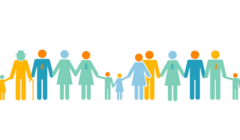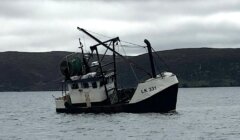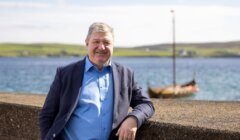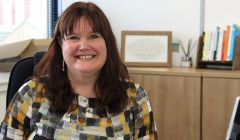Council / ‘We need to break that cycle’ councillor says amid call for deeper engagement around poverty
THE COUNCIL should look to engage with people who have overcome adverse life experiences in order to get a better understanding of poverty among young people in the isles.
That is the view of Lerwick councillor John Fraser, who spoke up about the issue at a council meeting on Monday.
He reiterated it is “okay not to feel okay” – but the elected member believes more can be done as stigma continues to be an issue for people seeking help.
Fraser’s views came as part of discussion around Shetland’s latest annual child poverty action report at a meeting of the council’s policy and resources committee on Monday.
The report re-emphasised that the percentage of children and young people living in poverty in Shetland increased from 13.3 per cent to 15.8 per cent.
But that only takes into account the year through to 31 March 2020, so the impact of the Covid pandemic is not included in the figure.
The report, which is a joint project between Shetland Islands Council and NHS Shetland, said “we must continue to tackle the underlying causes of poverty, focus on early intervention and prevention, and work hard to remove the stigma sorely felt by those who experience the realities of poverty in their daily lives”.
Fraser said there was also a poverty of opportunity for some children, and he noted that this could happen in families struggling with mental health or addiction.
This can create adverse life experiences, he said, which can lead to trauma.
“We need to break that cycle,” Fraser said.
He added that the “sad reality” was that while there continues to be talk around tacking child poverty, people are suffering.
A report to councillors did highlight some positives; it said the SIC’s children’s services finance team worked with colleagues to ensure households entitled to free school meals and clothing grants received payments directly into their bank accounts throughout the last 18 months.
Become a member of Shetland News
The schools service also accessed funding from the Scottish Government to provide 470 mobile devices to “address the digital divide and support learning”.
The child poverty report said part of the council’s role is to invest in economic development, which in turn creates employment opportunities.
It highlighted the launch of new fish markets in Scalloway and Lerwick, the proposed space port in Unst and the energy project ORION.
Meanwhile Shetland South member Robbie McGregor sought to question whether more of the council’s own resources could be used in tackling child poverty.
It came after councillors were told the value of the local authority’s investments had risen by £21 million to £444 million at the end of July.
George Smith, who chairs the council’s education and families committee, however stressed that “no one organisation will solve child poverty”.
He said there needs to be efforts from government through to health boards and the third sector.
Shetland Central member Davie Sandison warned of an impending pinch point revolving around a planned £20-per-week reduction in Universal Credit and the end of the furlough scheme in addition to rising fuel prices and winter.
He described it as a “quadruple whammy”.
Town councillor Stephen Leask agreed – saying “things aren’t going to get any better” – while Macgregor said the Conservative government’s universal credit cut “beggars belief”.
Fellow south end member Allison Duncan asked if a specific body should be set up to cover child and fuel poverty, but council chief executive Maggie Sandison said she was worried this would dilute the control councillors already have on existing projects.
Council leader Steven Coutts, meanwhile, said elected members had the ability to influence both the community as well as decision makers in government.
The policy and resources committee also gave the green light to changes to the council’s school clothing grant and free meals policy following adjustments from the Scottish Government.
The minimum grant level for school clothing will increase to £120 a year for primary pupils and £150 for secondary children, while free school meals will expand in phases to include all primary bairns by August 2022.
The school clothing grant was paid to 467 pupils in the 2020/21 academic year.
Meanwhile a proposal to build a new Brae school was given the approval of the policy and resources committee.
Schools manager Shona Thompson said work into exploring site selection would commence if the full council backed the plans on Wednesday.
If the process moves to the next stage, an outline business case will be developed.
Become a member of Shetland News
Shetland News is asking its many readers to consider paying for membership to get additional features and services: -
- Remove non-local ads;
- Bookmark posts to read later;
- Exclusive curated weekly newsletter;
- Hide membership messages;
- Comments open for discussion.
If you appreciate what we do and feel strongly about impartial local journalism, then please become a member of Shetland News by either making a single payment, or setting up a monthly, quarterly or yearly subscription.















































































